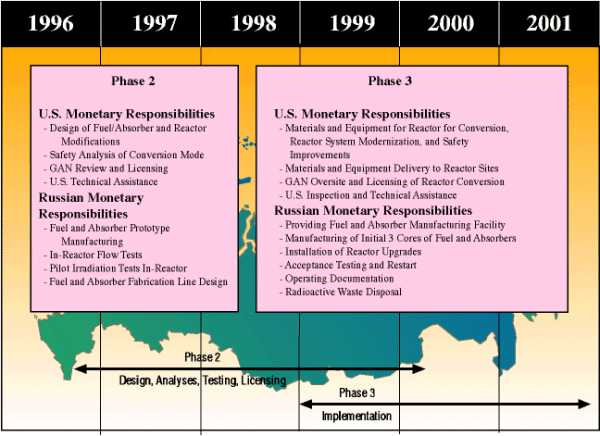
Safety Improvements
Although the primary reason for completing the core conversion project is to provide the technological means to stop production of plutonium while still providing required heat generation, core conversion also will improve the safety of the reactors during the period the reactors remain in operation. Examples of the factors that will make this possible include:
- As a result of core conversion, the Russian production reactors will be subject to GAN regulatory authority.
- The converted cores will lead to more stable operating conditions, which reduces the possibility of uncontrolled transient accidents.
- The plant's primary coolant systems will be reconfigured into two independent loops to maintain core cooling in the event of a major pipe break. A separate emergency core cooling system will be added to the reactors to mitigate consequences in the event of a loss-of-coolant accident.
- The minimum degree of subcriticality that will be achieved when the reactors are shut down and cooled will be increased to provide further assurance that the reactors can be maintained in a safe shutdown condition (that is, the reactors will remain subcritical when the control rods are inserted).
- Spent fuel storage pool facilities will be modernized to meet requirements for criticality safety with theenriched uranium fuel used for core conversion, and to improve control of water chemistry for long-term integrity of spent fuel cladding.
Replacement Power During Core Conversion
During the period when the ADE-2 reactor at Zheleznogorsk is off-line to have its core converted (currently planned for the summer of 2001), replacement heat and electricity will be provided to the region's more than 100,000 people by two Minatom-owned oil and coal-fired boilers.
Minatom and the mayor of Zheleznogorsk have signed an agreement specifying that the two Minatom boilers will provide a sufficient supply of heat and electricity to the region during the conversion outage. The outage is expected to extend from January through July 2001.
Providing replacement heat and electricity to the Seversk region of more than 100,000 people during the conversion of the ADE-4 and ADE-5 reactors will not be a problem, because only one reactor will be taken off-line at a time to undergo core conversion, the first in the summer of 2000.
The second Seversk reactor will undergo core conversion in the winter of 2001, after the first reactor has resumed operation in the converted mode. An existing oil-fired boiler at Seversk, owned by Minatom, can provide backup heat and electricity for that site if the reactor has an unplanned outage.
  |